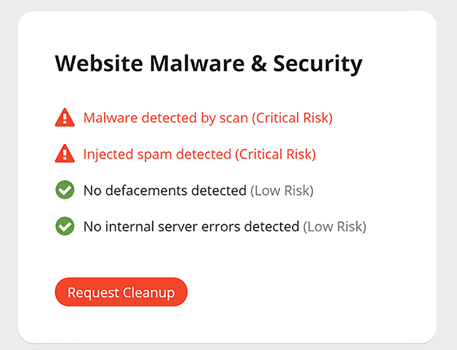Online Website Malware Scanner
Scan Website for Malware - Cybercrime is on the rise every day, and malware is the most common weapon used. Malware is short for malicious software that can cause harm to a computer or a website. Attackers use malware to steal data, customer information, control a website, etc.
Most of the time, the victim doesn’t even notice the attack until it’s too late. Every day, new cases of malware come up, and website owners need to know how to combat malware. The basic thing you need to do is increase the security of your website.
How To Check Your Website For Malware?
Regularly check your website for malicious content and malware. Learn to check the signs of malware and make use of trusted website scanners to keep your website away from malware. The following guide will tell you how to scan a website for malware.
Identify common malware signs on your website
It can be challenging to notice malware on your website, and some owners think that visual change is the only way to detect malware. However, malware can be identified by other signals, too, and you need to be sharp.
Check that your login information is not changed and if the website’s files have been modified. If there is a sudden decrease in traffic and the site crashes frequently, it may be because of malware. Malware can be elusive, and that is what makes it dangerous. You need to be quick in identifying any faults.
Use a URL Scanner
A URL scanner is a great tool that will help you identify if your website has malware or harmful content. Many websites offer free URL scans. Popular ones like VirusTotal have multiple antivirus scanners to look out for malware.

The websites also offer domain and URL blacklists. You can check if your URL has been blacklisted recently for malware or suspicious content. If you find your website on a blacklist, then you will have to crack the source of the problem. URL scanners will help you identify malware and keep your website secure from cyber threats.
Check for malware in the website’s source code and files
If you are trying to search for malware in a website’s source code, you will need two checks two attributes, iframe attributes, and script attributes. Check unfamiliar URLs or and file names. Any suspicious activity here is a clear sign of malware and cyber threats.
Looking out for malware in a website’s files can also be effective. Search for malware and suspicious content in the files using the file manager. Check out the signs that are common on Wordpress and CMS websites.
Make use of Automatic Website Malware Scanner Tools
Cybercriminals are on the rise and are not slowing down. You will need high-level security and protection to keep your website safe from attackers. Online scanning tools are perfect as they will detect malware on your website in a limited time.
You will be alerted about the malware at the right time and take the necessary action to remove it. Some scanner also helps in removing the malware. A good online scanner will offer the best protection and identify recent and robust malware. Some of the best online scanning tools are:
1. SUCURISUCURI is a famous security provider that provides scans for multiple website platforms, including WordPress, Magento, etc. Apart from malware detection, SUCURI will tell you about any spams, and blacklistings on Google, Opera, McAfee, etc.
2. Astra SecurityIt offers both free and paid malware scanning. The free version scans your website’s code for malicious content, blacklistings, malware, etc. You can even check security audits and SEO spams.
The paid version is even better as it can access your website’s internal files and provide better protection against cyber threats.
3. VirusTotalVirusTotal is another online scanning tool that scans websites for detecting malware. More than 60 trusted threat databases are used for the tests. It will examine suspicious content and share it instantly. VirusTotal can be used to scan local files also, which is a great feature.
4. SiteLockIf you are trying to search for malware in a website’s source code, you will need two check two attributes, iframe attributes, and script attributes. Check unfamiliar URLs or and file names. Any suspicious activity here is a clear sign of malware and cyber threats.
Looking out for malware in a website’s files can also be effective. Search for malware and suspicious content in the files using the file manager. Check out the signs that are common on WordPress and CMS websites.
5. ReScanReScan is a great tool for scanning static and dynamic webpages. It checks a website for any risky ads or widgets, hidden redirections, and blackhat SEO links. ReScan also does a blacklist check for your URL.
Uses of cWatch Website Scanning:
- Helps to improve website speed
- You will get instant Updates and alerts on your site.
- cWatch provides anytime protection to your website.
- Improves Search Engine Optimization to boost the site's traffic
- cWatch provides a security badge to the website which helps to gain Visitor’s confidence.
Benefits of cWatch Online Website Virus & Malware Scanner
Cybercrime is evolving every single day, and it is vital to keep your website’s security up to date. Whether you identify malware yourself or use an online scanner, it is essential to know about any prevalent malware and remove it immediately.
Once you scan malware readily and fight against it, your website will be more secure and safe from cyber-attacks.
How to run a virus scan on a website?





